There will never be another horse exactly like yours. You know better than anybody that he’s an individual with a distinctive personality and characteristics with little quirks and endearing habits. He’s the product of a unique combination of influences: heredity, upbringing, training and living environment. And these differ for each horse, making our equine friends diverse and our relationships with them personal and special.
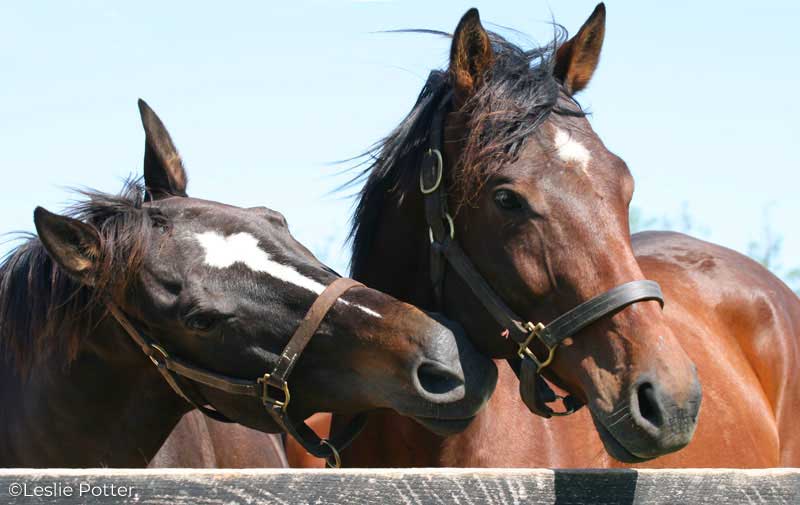
Still, you can generalize about horse temperaments and use these generalizations to strengthen your relationship with your horse. Once you develop a better understanding of your horse’s basic nature—the good and the not-so-good—you can tailor his training to best meet his needs. Perhaps even more importantly, you can develop realistic expectations for him. You can recognize and eliminate goals that are too lofty, freeing both you and your horse from the stresses of unattainable expectations. It’s a win/win situation.
The six basic temperament types for horses are defined as quiet, interested, nervous, extremely nervous, stubborn and treacherous.
According to J. Warren Evans in the popular animal science textbook Horses: A Guide to Selection, Care and Employment, there are six basic temperament types. He defines them as quiet, interested, nervous, extremely nervous, stubborn and treacherous. While I agree with Dr. Evans that these are the general personality types into which most horses fall, I believe most horses actually fall into more than one category due to their individuality, and that this can vary with the situation and even change over time due to differences in human handling and environmental stimulation.
Do you already have a sense of which category or combination your horse fits into at this point in his life? Here’s a rundown on the temperament types and how each is best handled:
Quiet.
This horse is commonly referred to as bomb-proof by owners and a packer by riding instructors for his unreactive nature. He will tolerate almost anything, from a fluttering flag to an uncoordinated rider with inexperienced hands. This type can generally be trusted to behave safely and to build the confidence of beginner riders, while a more advanced rider might consider him too dull.
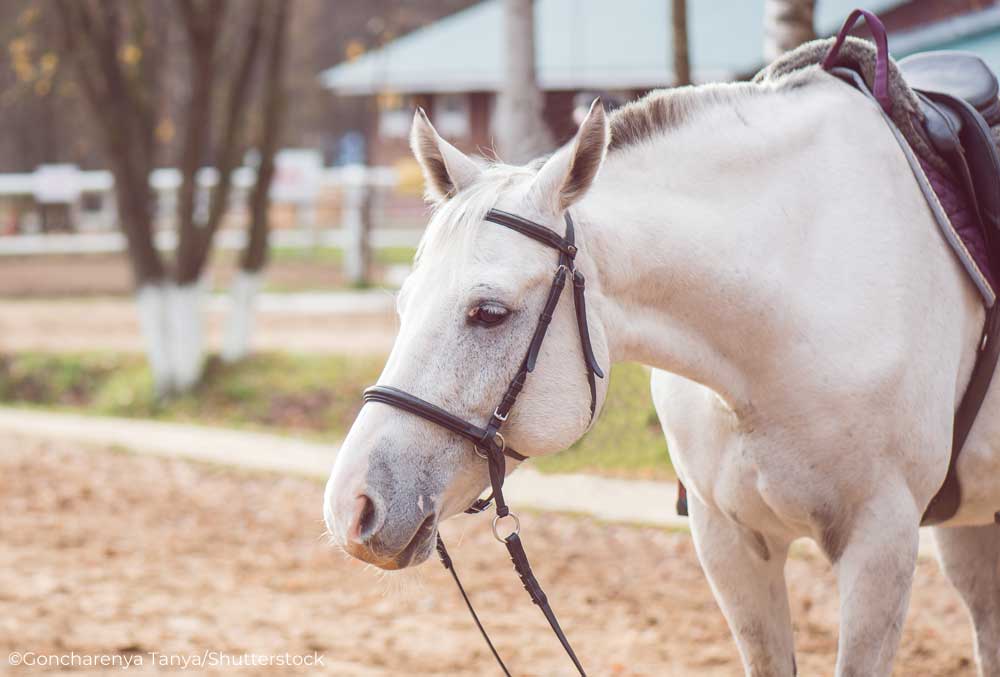
When I was a college student in an equine program, most of the horses we rode were young, inexperienced and unpredictable. Once in a while, something would happen to shake the confidence of a student. That’s when the unflappable Quarter Horse, Royal, would be called upon to do his stuff. This steady fellow would carry the shaken rider back to her former level of confidence. He would passably plod through any dressage test and quietly take any low fence no matter how he was brought to it. Royal was not dazzling by any stretch of the imagination, but the program director would not sell him for any price. Horses like Royal have an important role to play in developing riders, but they don’t come along often. Lack of reactivity is simply not typical of the species.
Interested
Interested horses are great for riders with a little training and experience. In well-trained hands, these horses pay attention to the rider’s aids but aren’t upset by them. While they are aware of their environment and respond to things going on around them, it’s unusual for them to react with fight-or-flight behavior. As long as this horse is handled with consideration and sensitivity, riders will seldom go wrong with this sort. Many of the horses you see collecting ribbons at local horse shows fit into this category, as they are both animated and dependable.
Nervous
Nervous is the personality type truest to equine nature, and consequently many horses fit into this category. The flight response in nervous horses is well-developed. They spook easily, perhaps even bolting to escape from perceived dangers all around. They tend to carry their heads high, looking for trouble and ready to react. For a quiet and experienced rider, this horse can eventually make a very nicemount. For a tentative rider, he can be a wreck waiting to happen. Most can eventually develop some trust and a sense of security from confident yet sympathetic riders who allow them to progress in training. They require extreme patience and confident handling from the rider. You cannot rush the trust they require before they can progress.
If you can learn to work with the challenge, these horses can be worth it and wonderful to show as they tend to possess an extra brilliance in spirit and movement.
Extremely Nervous
Extremely nervous horses are so reactive that virtually anything can set them off, and even changes in footing or shadows on the ground could cause fearful explosions at any time. Calm, consistent handling while slowly expanding their comfort zones will ultimately benefit them, but the road will be long and often dangerous. You must stay especially alert at all times. These horses are best left to professionals or to individuals with loads of experience and a solid foundation in equine behavior principles.
Stubborn
Stubborn horses tend to resent work and try to find a way out of it. When pushed, they often become irritable and balky, sometimes even exploding in temper. Trainers often encounter behavior that sets back training, requiring repetitions of lessons already learned. These horses also require riders with a lot of patience, but while the nervous horse requires a quiet hand, stubborn horses need a tactful yet firm approach.
Treacherous
Treacherous horses, with the notable exception of a few naturally aggressive stallions, are nearly always either a product of bad handling or benign neglect. They either haven’t learned to respect humans or have learned to actively resent them. Such horses may unexpectedly attack humans by kicking, biting or stomping on them. Horses who simply lack an understanding of their place below humans on the dominance hierarchy may sometimes be reformed by the most experienced of handlers. Sadly, euthanasia is sometimes the only safe solution for savage horses. Fortunately, such horses are rare.
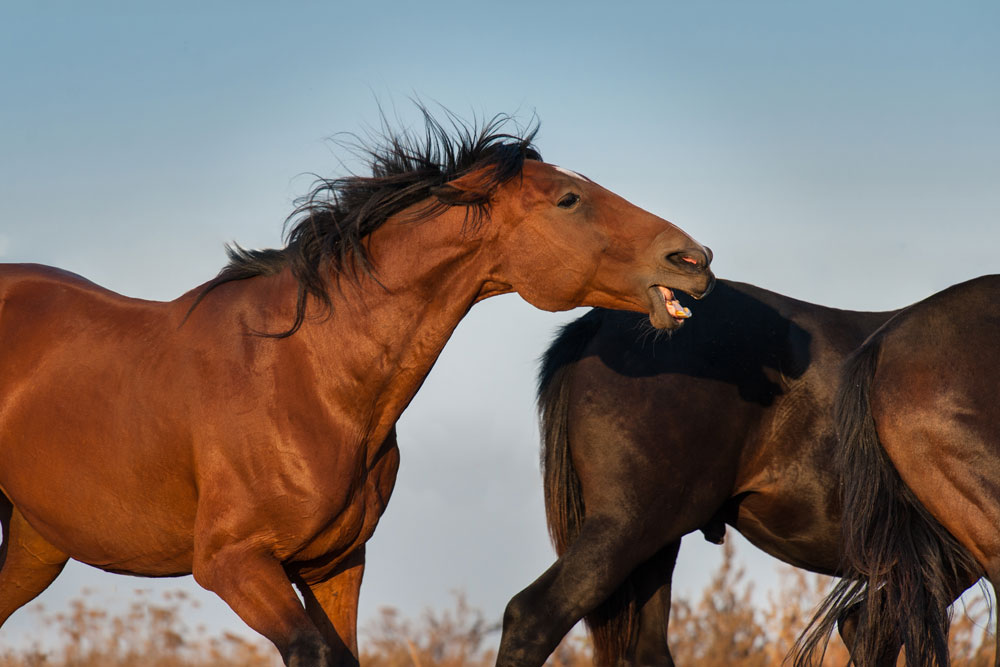
Many horses seem to fluctuate daily between types. My mare Duchess oscillates between the interested, nervous and stubborn personality types. Consequently, there are days when she’s brilliant and very responsive. Then there are days when she seems to resent her work, prancing or grinding her teeth. I can’t force her compliance, but must develop it from her willingly. Each day is another chance to bring out her best. It requires me to use my creativity and to be a gentle and tactful teacher. But this is what makes each ride unique and each day a lesson.
Liked this article? Here are others you’ll enjoy:
Connecting with Your Horse
Working with Your Horse’s Horsenality

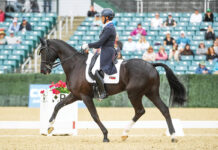
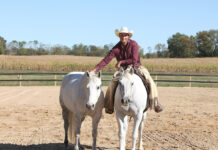
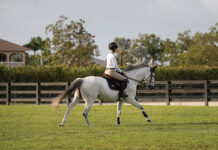



informative well written helpful,
Very interesting article. I feel my horse is interested with a little bit of nervousness.
i think this article is very imformative. i think my horse is interested with a little bit of quiet in her.she is a school horse so her personality is perfect for her job.
Very informative.
Hi,
I have looked up tons of stuff on here, but it is all “EXPIRED”.
bye-bye
good article! good job explaining clearly. my horse is definetely stubborn!
Good Writing.
It was well written. I see that my mare is mostly interested and nervous. Good article.
Interesting Article
Very interesting article.
I have a 15yr old appaloosa, she knows everything she needs to know, but when she’s done, she’s done. She will balk, rear, or refuse to go your way. I ride her with a crop because she likes to pull her head. Any suggestions?
bskaj@jun.com Sandy
Hi There,
I have a Dutch warmblood who falls in most categories. I tend to agree with you that there is no cut and dry in personality types and things can change from day to day for whatever reason. I adore my horse but he can be extreme in his behavior. I know for one thing that force is never an answer and negotiating and patience will get you farther with the stubborn types who overreact when you ask a simple thing. The next day that simple task might not be an issue so I have learned to not take it personally and try again another time. Thanks for bringing light to the subject. I appreciate reading about it.
It’s great, because she can be stobbornor fight other horse off.She has PMS.
MY horse is RB E
Great article- very helpful. I found that I have one quiet pony, one interested horse, and one horse that is somewhere between interested and nervous. Thanks for the interesting article!
Very nice article, I have worked with horses for a long time. I noticed the difference from one horse to another but never thought about catorizing them in this way. Very informative for someone who has more than one horse.
I found the article interesting and informative.
I like the article!!!
Very interesting article – i really enjoyed it – i found out i had a interested horse – great article!!!
great information!
that was a great little article. It really allowed me to see for sure which one my ” girls ” are. Thank you froa llyour continued insight oin these wonderful creatures.
very good info
quiet for me!
This is a very helpful article. I found out I have a Quiet, and Interesting horse.
This article is a 5 out of 5! I love it. Helps me with my horses.
I LOVE THIS ARTICLE! this helps huge with the horses at the barn where I work. Now I know how to teach with each horse and how to work with each horse. Thanks!
Interesting article. It neatly pegs horses into categories but I think is lacking something. I cannot put my mare into any of the categories above. She is someplace in a mix of Quiet Nervous and Interested. I’d say just intelligent.
So altogether an interesting but unsatisfying article for me on the subject. I think equine personalities are much more complex than this.
I agree with Cherie, my horse is interested yet Quiet, which those two categories don’t seem to mesh well. She’s always quiet and reliable but also interested in everything.
I agree that this article has more complexities to it in terms of a horse’s personality. It’s important to realize EVERY HORSE IS DIFFERENT. Therefore it can be many things at once. Not just one thing or another. It’s more complicated when things are bunched up in terms of temperament and personality but if we learn to read the horse, and if we know the horse well, then we can create some solutions that we think is best for the horse. In terms of reading it and knowing how it’s feeling and what type of horse it is. Horses are very expressive and emotional animals. Therefore, their personality can change from time to time. They are unpredictable so their temperament is likely to change. We just have to be able to read them and udnerstand them in order to know what’s right. But over all this article is good in terms of covering a few good points on this topic. ^_^
For the best description of horse personality types & how to deal with them that I have ever read in my 40 years of riding, I strongly recommend “Ride the Right Horse” by Yvonne Barteau. Excellent!
neat article
The one you call “treacherous” isn’t “below” humans at all. None of them are. You just want to control them and keep them “below” you, for your own use. Same as “slaves” were used, and considered “below” whites. Any horse kept in captivity, and used by people, will display temperament based on how accepting he or she is of captivity. Horrible that the horses who refuse to comply with selfish human demands are murdered by humans.
This is great now I can tell that my horse is interested and that helped.
This is a great article!
cool info!
PRETTY GOOD THINKING IN MOST AREA’S
Interesting reading! My mare definetely falls into the interested category the majority of the time, but then that stubborn category pops up, too!
Pretty good,
Jack falls into the interested/nervous category
for sure..
I like Parelli’s horsenality a little better, but enjoyed this different view!
Yes, I have to agree that Parelli has the horsenality thing down and is the most excellent horse phychologist there is.
I don’t have my own horse yet. But I have been riding the same horse for over a year. All of these personalities make sense. Even just being around horses you can tell which catagory they fall under. The horse I ride is Stuborn. And the personality he described for stuborn says Doll(the Horse I ride).
Cisco falls into the interested horse. He is my first horse and has taught me a lot. He loves to run his heart out, But he usually cant because of a hurt leg, so he is hard to slow down. I can see me and him getting ribbons in the show ring. He used to be a roper and won plenty of ribbons
That’s pretty interesting….but i’m not sure that the horse I ride would fit into any of these categories….Maybe somewhere between interested and nervous?
I think the horse I lease would definately fall under the Interested category. Some people might think he’s nervous since he’s really fast and sometimes bucks, but that’s purely habit. He’s not actually scared.
It’s just from bad training in his early years…
My horse would definitely fit in the interested group. She has to see every thing. She even came running to see what was wrong with my mom when she screamed because she saw a snake.
jett is prolly in the interested or nervous group! he is always very aware of things around him, and he’s not usually nervous..though he is scared of cows..maybe he’s inbetween interested and nervous.
This article was very helpful. It confirmed what I already suspected in regards to my horse. Also, it helps in continuing his training and the approach I should use. Thanks!
This article really helped. My dads friend mentioned to us one day that he had 2 horses on his land that he was boarding & the owner had just left them there & her father only came out every now & then to take care of them. They never gave them any training or love, so their 5 month old foal literally tried to kill us when we got near him, we were on his territory & he was the boss. But he is getting a little better since he’s still a foal & he’s not bigger than us. I’m working with the mom who just needs a refreshed memory in handling & training, while my dad tries to take on the treacherous one. He is so pretty & he is so big for a foal, he has SO much potential! It would be awful if he had to be euthanized. Pray that he doesnt have to. <3
good tips
Cool article. My mare is more the quiet type and my daughters horse is more interested.
Since most of my horses are young, they are in the interested stage. I work with them and keep moving them out of the comfort zone, until they will follow me anywhere U ask. If you show your horse they can trust you, they will follow.
I agree with James from Vanderbilt, PA.
P.S. Sometimes a horse is agressive because it is mentally ill, for example, equine A.D.D.
great tips i think my horse, a thoroughbred ex-racehorse is in between quiet and interested. like, he doesn’t spook easily and will do anything you ask but he has a high energy level which can make him hard to ride
Most of my horses are young, but fall into the quiet and interested group. It will be fun to see how the mature.
I guess my horse is a combination between interested and quiet. He’s a lesson horse,(which helps with the boarding price)so he’s quite with them. With me is very interested.
Soo true, my mare is always sooo mellow, the people I bought her from said the most they ever saw her do was a little crow hop here & there…but today when I was gettin my pony out of the paddock she breezed right by me & started bucking & kicking like a true rodeo horse, then once I got her she reared up at me!! I was soo shocked!
this helped me so much! my horse is a mix between stubborn, and interested.
This is pretty cool! I’d say that my horse is a mix of interested and nervous, depending on the day. But what more can you expect from an Arabian mare? 😉
my horse is a interested type
i love that about him !!!
Bell
I have a mixture of interesting, quiet, and some that are nervous in a different situtation.
people have said I go where angels fear to tread…i have found basically all the personality traits you describe in this very astute article because of the wor I do…i am a freelance trainer, for horses& owners with issues or problems, backyard rescues and raw/green horses.This article is very accurate and I truly wish some of my clients understood what and why I was doing things a certain way….owner participation is a must.Thank you for explaining things so beautifully and simply…
i don’t have a horse–but this is really interesting!
My guy is a very difficult boy to deal with. He is a Quarter Horse but he acts like a high strung Thoroughbred. Every day he seems to contain a different personality. Most days he is a Nervous, Stubborn type. But he has many days where he becomes a Treacherous, Extreamly Nervous type. For the entire time I have owned him we have had a few days were he was the perfect Quiet type that would give pony rides to the neighbors kids after me and him have a light session. He spooks and sometimes pushes me to the limit but i still love him and no madder what he would never be put down or badly injured for his actions.
My arab mare’s curiosity is extreme! She is the nervous sort,so the best way to work with her is to let her think. She will often chew on something like a tree or her bit as she thinks things through.
All I ask her to do is look at whatever is scary and if safe she walks up and touches it with her nose.
I have also noticed If I can make eye contact with her, no matter how terrified she is she will calm down. I think it takes her mind off everything else because someone told me horses can only think of one thing at a time,and she is thinking maybe I,ll give her a treat.
My dappled brown arab mare Poppy is still young and acts it too. So she is always going between stubborn quiet and nervous. But it doesn’t help that she has a bad temper towards other horses! She is usually being chased by other mares while I’m riding her. 🙂
great article discribes my mare to a tee. I know know that she is interested and nervious. She is a good horse just needs to learn a littlr respect so we can get on with the trust and relationship part.
informative, unemotional, good, balanced information
My horse is a big sweet heart, and would never hurt a fly. She is NOT A push button horse, but she responsed well, and she will tell me when I do something wrong, like she will stop at a fence if I am pulling to much with my hands.
my horse is a few of those things. You can do almost anything on him, he made me feel more confdent in the saddle, but he isnt bombproof. He is scared of plastic bags, or anything like them for that matter. he is a dependable trail horse, but when you ask him to go. he will GO. the only problem with that is after we lope, he has a hard time settling down. but we are getting much better!
i wish i had a horse
This article was very interesting and I learned some things! My horse, Storm, is Interested, Stubborn, and Nervous!
This article was very helpful. I am at a barn with lots of horses and can see how they can be categorized. I also agree they have a Main personality with a secondary one.
Don’t worry you will get a horse one of these days and you will have a blast with him or her. I know form experiance that horses are miracle workers for your confidence and self-esteem. I have been riding horses since I was 2 years old and know I’m 12 and the most confident in the 7th grade at my middle school!!!!!!!!!! Have fun when you get your horse!!!!!!!!!!!!!!!!!!!!!!!!!!!!!!!!!!!!!!!!!
Very good article!
What exactly is the validation procedure for determining horse temperament?
can someone please helpme? Myhorse is a yearling and she is a mastermind and gets out of anything i put her in (yes, even electrical, she does not care!!) and she disrespects me horribly. She rears at me (and tries to land on me) i have never done anything but nice actions towards her, and she continues to act like this. Yes, i tell her to get out of my space when shes in it (by doingjumpingjacks) and every chance i fet she still tries to hurt me.
Hailey, I would find a good trainer that can help you. Chances are, your horse has just not been taught appropriate manners, and has learned that she can rule the barn. In the mean time, if you are familiar with lounging, I would try that. Take her to a round pen on a lounge line, and have her go at least at a good working trot until she lowers her head, licks her lips, and is obviously paying attention. Once she does these things, ask her to stop and stand and face you. If she stays, try to get her to willingly follow you around. As soon as her attention moves off you or she starts acting disrespectfully, send her around the pen agiain. This will teach her that you can make her move her feet, and she has to listen if she wants a break.
Hi Hailey. As far as being the escape artist, you should seek professional help so your filly doesn’t injure herself. As far as respect for you gos, I suggest ground work. Get her to move her feet. Never punish her but correct her and reward the slightest try. Be as gentle as you can but as firm as nessasary. I’d like to refer you to Clinton Anderson, who is very good with horse-owner problems.
I hope everything works out.
Very interesting article.
Wow, i never knew all of this
interesting
cool,i love it.my horse is quiet and intersted.
my horse is a nervous interested type. hes great(:
My mare is definately nervous type. She does hav a lot of tb influence though. Are TN Walkers usually high strung?
Cool. Mine is stubborn and interested. But he has his good and bad days like anyone.
hummmm, interesting!!!
Neat!
Cool!
This is so cool!!!
cool
I would have to say my horse is interested. And I love him.
VERY INTERSTING READ, ,although I’m still confused on which category my horse falls into.I have a 8 yr old gelding that raced his whole life until this year. He seems to be very anxious and reactive but at the same time non spooky ,if that makes sense,he tends to be aloof but yet comical,he gets irritated when groom him and gets very annoyed trying to kick,he also is not one to be loved on ,but at times will keep his face pressed to mine until I move,,I was told that perhaps he takes after his grandsire and great grandsire storm cat and storm bird who I was told were not very nice,,well I wish someone could give me a glimpse of hope as I love him,,